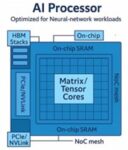The first article in this series examined how feasibility exploration (hyperlink to SemiWiki first article) enables architects to evaluate multi-die system configurations while minimizing early design risk. Once architectural decisions are validated, designers must translate conceptual connectivity requirements … Read More
How Customized Foundation IP Is Redefining Power Efficiency and Semiconductor ROI
As computing expands from data centers to edge devices, semiconductor designers face increasing pressure to optimize both performance and energy efficiency. Advanced process nodes continue to provide transistor-level improvements, but scaling alone cannot meet the demands of hyperscale AI infrastructure or ultra-low-power… Read More
Designing the Future: AI-Driven Multi-Die Innovation in the Era of Agentic Engineering
At the 2026 Chiplet Summit, Synopsys presented a bold vision for the future of semiconductor innovation: AI-driven multi-die design powered by agentic intelligence. As the semiconductor industry shifts rapidly toward chiplet-based architectures and 3D stacking, the complexity of design, verification, and system integration… Read More
Hardware is the Center of the Universe (Again)
The 40-Year Evolution of Hardware-Assisted Verification — From In-Circuit Emulation to AI-Era Full-Stack Validation
For more than a decade, Hardware-Assisted Verification platforms have been the centerpiece of the verification toolbox. Today, no serious semiconductor program reaches tapeout without emulation or FPGA-prototyping… Read More
Smarter IC Layout Parasitic Analysis
IC layout parasitics dominate the performance of custom digital, analog and mixed-signal designs, so the challenge becomes how to identify the root causes and to quantify the effects of parasitics during early design stages. The old method of iterating between layout, extraction, SPICE simulation, followed by manual debug… Read More
Accelerating Static ESD Simulation for Full-Chip and Multi-Die Designs with Synopsys PathFinder-SC
As analog and mixed-signal designs become increasingly complex, parasitic effects dominate both design time and cost, consuming 30–50% of engineers’ effort in debugging and reanalyzing circuits. Addressing these multiphysics effects requires early verification strategies and reliable simulation solutions. Modern … Read More
Podcast EP330: An Overview of DVCon U.S. 2026 with Xiaolin Chen
Daniel is joined by Xiaolin Chen, Senior Director of Technical Product Management for Formal Solutions at Synopsys. She has over 20 years of experience applying formal technology in verification and partnering with customers to identify opportunities where formal methods are best suited to solve complex verification challenges.… Read More
2026 Outlook with Abhijeet Chakraborty VP, R&D Engineering at Synopsys
Tell us a little bit about yourself and your company.
My name’s Abhijeet Chakraborty and I’m Vice President of Engineering at Synopsys. I led the development of Synopsys Design Compiler-NXT, the industry’s leading synthesis product, and now oversee the company’s multi-die and 3DIC product portfolio. Throughout my career,… Read More
How 25G Ethernet, PCIe 5.0, and Multi-Protocol PHYs Enable Scalable Edge Intelligence
Physical AI is changing how intelligent systems interact with the real world. These systems must sense, process, and respond to data in real time. Unlike cloud AI, Physical AI depends on fast local processing and reliable distributed communication. This shift creates a new challenge. Systems must move large volumes of sensor… Read More
Advances in ATPG from Synopsys
I first learned about ATPG – Automatic Test Program Generation in the 1980s at Silicon Compilers, then continued in the 90s at Viewlogic with the Sunrise tools, so it was illuminating to get an update from Synopsys on their ATPG technology by attending a webinar. Synopsys over the years has developed a family of test tools, shown … Read More









